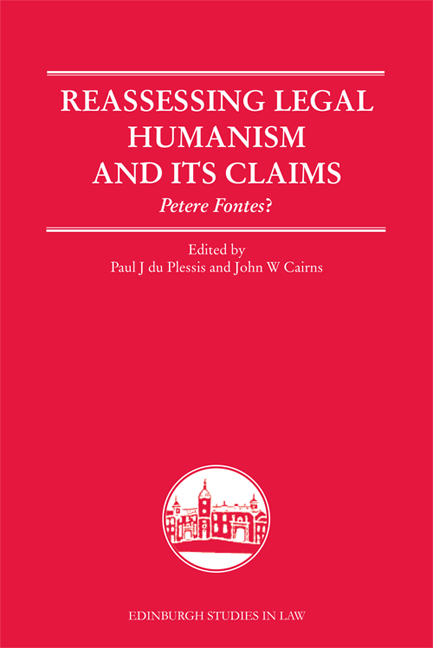Book contents
- Frontmatter
- Contents
- Preface
- A Note on Names and Book Titles
- List of Contributors
- List of Abbreviations
- Introduction
- Part I DEFINING LEGAL HUMANISM
- Part II A BREAK WITH THE PAST/CONTEMPORARY CRITIQUES
- 3 Deconstructing Iurisdictio: The Adventures of a Legal Category in the Hands of the Humanist Jurists
- 4 Reassessing the Influence of Medieval Jurisprudence on Jacques Cujas’ (1522–1590) Method
- 5 Redefining Ius to Restore Justice: The Centrality of Ius Gentium in Humanist Jurisprudence
- Part III LEGAL HUMANISM: A PAN-EUROPEAN METHODOLOGY?
- Part IV LEGAL HUMANISM AND THE BOOK TRADE
- Postscript
- Index
5 - Redefining Ius to Restore Justice: The Centrality of Ius Gentium in Humanist Jurisprudence
from Part II - A BREAK WITH THE PAST/CONTEMPORARY CRITIQUES
Published online by Cambridge University Press: 05 September 2016
- Frontmatter
- Contents
- Preface
- A Note on Names and Book Titles
- List of Contributors
- List of Abbreviations
- Introduction
- Part I DEFINING LEGAL HUMANISM
- Part II A BREAK WITH THE PAST/CONTEMPORARY CRITIQUES
- 3 Deconstructing Iurisdictio: The Adventures of a Legal Category in the Hands of the Humanist Jurists
- 4 Reassessing the Influence of Medieval Jurisprudence on Jacques Cujas’ (1522–1590) Method
- 5 Redefining Ius to Restore Justice: The Centrality of Ius Gentium in Humanist Jurisprudence
- Part III LEGAL HUMANISM: A PAN-EUROPEAN METHODOLOGY?
- Part IV LEGAL HUMANISM AND THE BOOK TRADE
- Postscript
- Index
Summary
A. INTRODUCTION: WHY REASSESS LEGAL HUMANISM?
B. ULRICH ZASIUS
C. JUSTICE, IUS, NATURAL LAW AND IUS GENTIUM
D. IUS GENTIUM, RIGHTS, OBLIGATIONS AND CIVIL LAWS
E. ABSOLUTE SLAVERY AND ARBITRARY POWER
F. CONCLUSIONS
INTRODUCTION: WHY REASSESS LEGAL HUMANISM?
“Much, perhaps, too much,” in the words of Donald R Kelley, “has been written about legal humanism.” Yet, little, indeed, much too little, of this literature has explored conceptions of ius gentium (customs in common among all mankind) within humanist jurisprudence (or legal humanism) and its relation to natural law, and especially in relation to ius– or right– in both its subjective and objective aspects. As such legal scholars, political theorists and rights scholars alike hold that Renaissance humanists, and early sixteenth-century legal humanists in particular, had nothing substantive to say about these fundamental categories, and therefore, careful attention to their works will yield little, if anything, to our understanding of the history and development of political and legal thought.
This is the case, we are told, because early humanist jurists such as Guillaume Budé (1467–1540) in France, Ulrich Zasius (1461–1536) in Germany, and Andrea Alciati (1492–1550) in France and Italy, turned away from the dominant Scholastic natural law and natural rights discourse of the late-medieval and early modern periods (wherein these categories are central), and turned instead to discussions of the cultivation of civic virtues, civic utility, and procedures for securing the common good. As a consequence of their focus on civil law, they had little interest in– or patience for– abstractions such as natural law, ius, or ius gentium. Indeed, given their emphasis on civic matters, Richard Tuck concludes that humanist jurists “found it virtually impossible to talk about natural rights, and extremely difficult to talk about rights tout court”. Likewise, Brian Tierney holds that because “[h]umanist authors emphasized above all the duty to uphold the common good”, they were far more concerned with the obligations of subjects and citizens than with conception of rights (natural or otherwise).
- Type
- Chapter
- Information
- Reassessing Legal Humanism and its ClaimsPetere Fontes?, pp. 108 - 134Publisher: Edinburgh University PressPrint publication year: 2015



